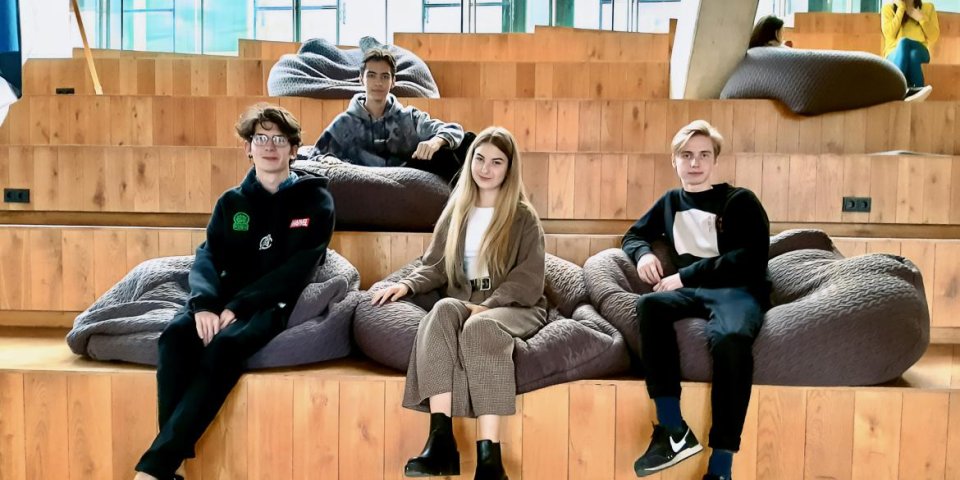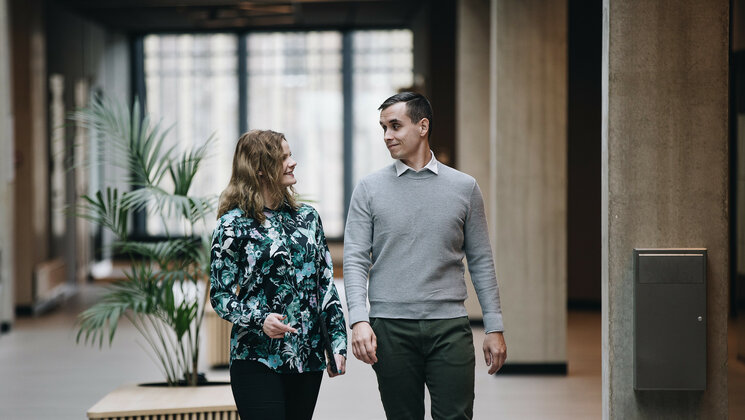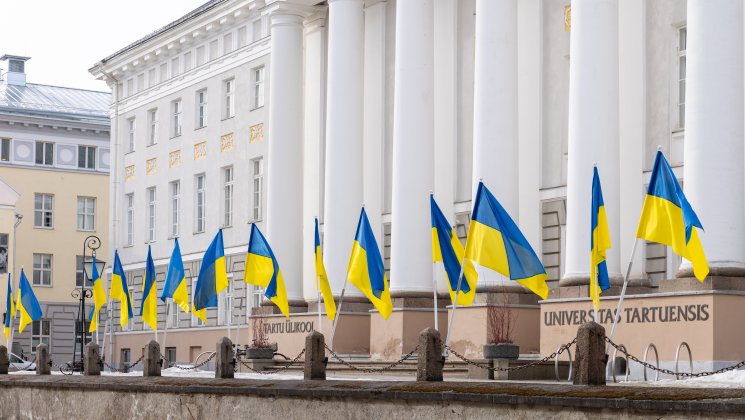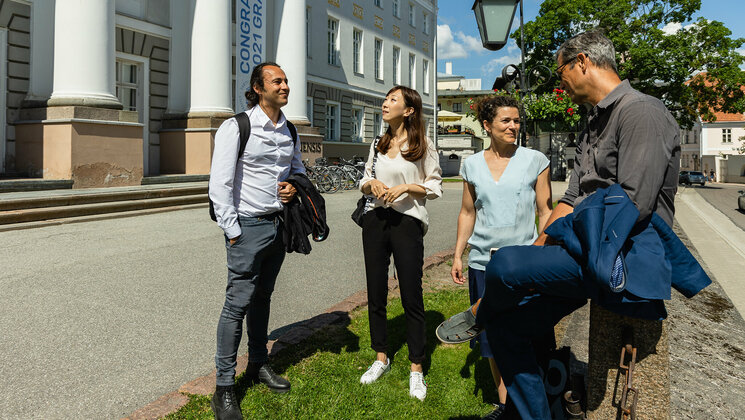Ukrainian students at Narva College: How can this be possible in the 21st century?

Villu Päärt, freelance journalist
In February, they were 16 years old, in the last year of upper secondary school in Ukrainian towns. Now they are in Narva. Nine months have passed since the war began. The war scattered their classmates around the world.
These four young Ukrainians met for the first time this autumn at Narva College, where they started their studies. During the first year, they take intensive Estonian courses so that they can start the studies of their specialisation in Estonian a year later. The three young men will study information technology, Maria wants to become a language teacher.
At the end of September, they shared their memories of the beginning of the war, their fears and leaving their homeland behind with Universitas Tartuensis. The interviews took place before the Kerch bridge explosion and Russia's heavy air strikes on Ukrainian cities.
Andri's story
The anticipation of war was in the air. For over half a year, Russia had been massing large numbers of troops behind the Ukrainian border, and people were talking about the imminent war every day.
On the evening of 23 February, Andri Stakhov tried to convince his mother that there would be no war. "That would be absolute nonsense," he said. He was on his phone until two o'clock in the morning, surfing the internet and exchanging messages with friends.
"At seven o'clock in the morning, my mother woke me up and told me the war had started. I didn't understand what she was talking about. What war?"
Then he saw a friend's message on his phone: explosions, planes in the air.
Their apartment is near an airport. It's a civilian airport, which wasn't bombed much. But he could hear the noise of the explosions, and the air raid sirens were wailing.
The streets were deserted. People flocked to ATMs to withdraw cash. Shops were emptied of groceries.
"On the second day of the war, me, my sister, my brother, my grandmother and grandfather and our dog drove to the countryside in Kyiv oblast, south of Kyiv, where there was no fighting, only air raid alerts," he says. His parents stayed in Kyiv to protect their apartment from looting should it come to that.
Andri says that March was a very sad month. It was hard to bear not knowing what would happen next.
"Honestly, before the war, I didn't believe that Ukraine could resist the Russian attack. Only when the war began I started to believe that Ukraine could. At the end of March, good news came when the Russians withdrew from northern Ukraine. On the other hand, we heard what had happened in Bucha," says Andri.
Until the beginning of the war, the city of Irpin, next to Bucha, was home to a famous economic college, at which Andri hoped to start studying international economic relations. The campus was hit by a rocket. Russian soldiers tortured and killed townspeople. The town is still mined. This path to the future was gone.
"So, I decided to look at the opportunities many of the world's universities offered to Ukrainians. Poland, Estonia, Czechia... On Facebook, I came across the programme offered by the University of Tartu Narva College."
One of Andri's classmates is now also in Narva. Most of his former classmates have left Ukraine and gone to Poland, France, Slovakia. In mid-September came the sad news that their computer science teacher had been killed at the front in Kherson. The family decided to leave Ukraine in August, taking a bus from Kyiv to Tallinn.
"In the summer, it became clear that Ukraine could liberate its territory militarily, in time, of course. Predicting the end of the war is a thankless task, but I think it will be over by next autumn," he says quietly.
Maria's story
Maria Nosko remembers the last day of peace, 23 February.
It was a perfectly normal day at school. She lived in Nova Kahhovka, near a large hydroelectric power station on the Dnipro River in Kherson Oblast.
"On that day, none of us thought the war would start tomorrow," she recalls. "At three o'clock at night, for some reason, I lost sleep and couldn't sleep anymore. Around half past four, I heard a strange noise, and my sister also woke up. There were explosions at the military base."
Their town fell under Russian occupation on the first day of the war. By noon, the Russian flag was on the mast and Russian war machines were everywhere.
The town was cut off from Ukraine. Food was no longer brought in. One could not get even the most basic painkillers against headache. People were afraid to leave the town, and the rumours became more and more frightening.
There was no work anymore, all the money went on food, but there was no way to earn extra. Going out on the streets was not a good idea because people were constantly being checked, for example, to see the photos on their phones.
"We were completely cut off from the world; there was no communication, the phones didn't work, not to mention the internet," says Maria.
To escape, her family used intermediaries who took the migrants across the front line in routed taxicabs. They left Nova Kahhovka in early May. Fear had held them in place, but by then, it was clear that staying in the town was no longer an option.
"I didn't believe the Russians would take our town in half a day – that they would come and destroy everything in their path. It became clearer that we had to leave; the situation was getting worse and worse. The decision to leave took two days. You can see that everything that has been here is now gone, but it's still hard to let go."
The family had acquaintances in Tallinn who had been in Estonia for three years. "At first, we stayed with them. It was me, my mother, my younger sister, my older sister, my brother and my older sister's fiancé. We had to start from scratch."
Maria graduated from upper secondary school with a gold medal and wanted to go to university in Kyiv or Kharkiv oblast. The first choice was psychology and the second languages. "When our town was occupied, my mother told me these were no longer the options. It was hard to leave my home, to leave my whole life behind."
There's a picture on her phone where all that's left of a tall apartment building is a concrete frame. This is where her sister's family used to live.
Maria keeps in touch with all her classmates – they are scattered all over the world. A few are in Ukraine but in safe places. Few have managed to continue their studies. Those who went to Germany are in grade 12. "I'm lucky to study at the university; a year won't be wasted."
All the students from Ukraine are living in a college dormitory in Sillamäe. Maria shares a room with a student from Russia. At first, she was afraid that the front line would run right through the middle of the dorm room.
"We can't solve diplomatic issues here, it would be silly to quarrel over politics. Fortunately, we have become friends. She's pro-Ukraine, she can look at the situation from different angles, not just as pictured by Russian news channels," says Maria.
Sviatoslav's story
Sviatoslav Baryshpal was living in Kyiv and closely following news reports that had been saying for months that Russian troops were massing behind the Ukrainian border.
"It was known since autumn that they would invade Ukraine. Even two dates were circulating, 16 February and 22 February," he says. Nothing happened on the first day; even on 22 February, the peace was still holding.
Waking up in Kyiv on the morning of 24 February, he noticed missed calls from friends on his phone. Normally, no one would call him at night, but they had agreed that if war broke out, the first to know would call and let the others know.
"It wasn't emotionally difficult for me, I was ready for what was happening. There's no need to panic, you just have to have a clear plan for what to do," he says with conviction.
Why did Russia go to war? "It's a revenge action. The Soviet Union was a powerful country, Russia feels weakened in the current situation. Their ideology is revenge," says Sviatoslav. He looks at least a few years more mature than his age.
In January, he had bought a decent power bank for his phone: if there's a war coming, he'd need it. He and his family fled to Estonia in March. With two cars. The direct route from Kyiv to Europe was out of the question because Russian troops had managed to cut it off from Belarus. They had to go round via Vinnytsia and Ivano-Frankivsk, across the border into Slovakia.
"I was planning to study programming at the Kyiv Polytechnic Institute. I took extra English and maths lessons to get very good results in the final exams. But even before the war, I was not sure I would stay in Ukraine, I thought I might study somewhere in the European Union. I was learning Czech and followed information about Czech universities," he recounts his pre-war plans.
He is equally convinced that if he had not been able to continue his studies, going to the front would have been a sensible choice. Fighting for your country against the invaders makes sense.
Matvi's story
Matvi Burchak remembers dinner on 23 February at his home in Dnipro.
"We were discussing how it could be possible in the 21st century that one country attacks another in the middle of Europe. It sounds like an anti-utopia," he says.
On the morning of 24 February, he had slept in and was rushing out the door not to miss the bus. "My mum shouted after me: where are you going, the war has started!"
On the third week of the war, at seven in the morning of 8 March, an explosion went off a hundred metres from their apartment building. The windows of the apartment blew out. Matvi woke up to a terrible bang. His room was full of broken glass.
"The Russians had wanted to shoot up a factory, but they hit a school building, where luckily there was no one at the time."
Matvi and his family came to Estonia in the summer. The journey from Dnipro to Estonia took them through the towns of Borodianka and Bucha, now known for their sad fate.
"The images I saw there were the most gruesome I have ever seen."
A dilapidated structure that had once been a filling station, which also sold hot coffee and mouth-watering pastries.
The giant Hostomel shopping centre, now just a ruin.
Even in the summer, he still had plans to study in Ukraine. Kharkiv was out of the question, but air raid alerts were also frequent in Lviv in the west.
His parents convinced him that if he wanted a decent education, it was not possible in Ukraine at the moment.
"My plan is to become a good programmer. Then I could live where I want," says Matvi. "Be it Bolivia or Japan. I don't know where I will meet the love of my life or which place I will fall in love with. When the war ends, I will definitely go back to Ukraine, this is where all my relatives are. Everyone I have."

These Ukrainians were 16 when they had to leave their homeland because of the sudden outbreak of the war. Pictured in the lobby of the University of Tartu Narva College: Andri Stakhov in the back, and Matvi Burchak, Maria Nosko and Sviatoslav Baryshpal in front from left.
PHOTO: Villu Päärt
Ukrainian students are adapting and learning Estonian
Kaja Karo, Communication Manager at Narva College
This year, 26 students from Ukraine started their studies at the first level of higher education at the University of Tartu Narva College. We received 57 applications and the academic potential of applicants was very good, but not all of them managed to leave Ukraine because of the war.
During the first year, they will study Estonian at the college to pass the B2 level exam at the end of the academic year and continue their studies in Estonian from the new academic year.
The majority of the admitted Ukrainians, 20 young people, are studying Information Technology Systems Development.
The students who have arrived in Narva are slowly adjusting to their new environment. They are learning languages and spending their free time as young people do. Most of them live in dormitories in Narva or Sillamäe. There is a free bus service between the cities, although commuting takes some time, as in the metro of a big city.
The whole college family tries to support Ukrainian students in every way possible. Our international relations specialist is their main support person. He advises them, helps them with paperwork, introduces the Estonian social system to them, and, if necessary, acts as a guardian for underage students. Some of our new students are indeed only 17 years old, as in Ukraine, students graduate from upper secondary school younger than in Estonia.
We organised their studies so that they could develop their Estonian and English language skills as much as possible. Other international students help with everyday issues: how the printer works, where the food is cheaper and what interesting events take place. At the beginning of the academic year, Ukrainian students took part in the cultural programme "Live the Lives of Estonians" at the Estonian National Museum.
Most students are financially supported by their parents. Students under temporary protection can get an allowance from the Estonian state and apply for a need-based study allowance. If a young Ukrainian who fled the war has only a residence permit for studying in Estonia, they unfortunately do not receive any allowances and may have to look for a job if they have to support themselves.
Ukrainian students can be supported by donating
Since the outbreak of the war in Ukraine, the University of Tartu has been actively engaged in supporting its Ukrainian staff and students.
This academic year, 205 new Ukrainian students started to study at tuition-waiver places at the University of Tartu, in addition to the 70 Ukrainians already studying here.
At the end of February, the university established a scholarship fund to collect and channel donations to support Ukrainian students' studies at the University of Tartu. The first call ended on 15 March. Then the collected donations helped to support 32 students with a total of 47,700 euros. Scholarships of €1,100 to €1,600 were awarded. We invite the entire university family to donate to the University of Tartu scholarship fund for Ukrainian students and share the word about the fund. Use the QR code to open the payment solution or make a (recurring) donation on the webpage of the University of Tartu Foundation.






